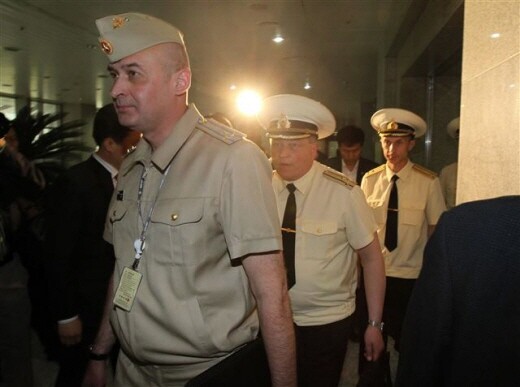hankyoreh
Links to other country sites 다른 나라 사이트 링크
Government protests Russia’s Conflicting Cheonan findings

By Lee Yeong-in
It came to light Friday that the South Korean government summoned the Russian Ambassador to South Korea and expressed strenuous objections over the Russian government’s failure to provide notification of the findings of its independent team that investigated the Cheonan sinking. The team was dispatched to South Korea around one month ago and concluded that it was unable to view the “No. 1 torpedo” as being the cause of the sinking.
According to military and foreign affairs sources connected to Russia, the Russian government provided notification of its independent investigation results only to the Chinese and U.S. governments last week, and South Korea only found out about the content indirectly through those two countries.
Following this, 1st Vice Minister of Foreign Affairs and Trade Shin Kak-soo summoned Russian Ambassador to South Korea Konstantin Vnukov to the Foreign Ministry on July 4 to express “astonishment” at Russia’s investigation findings because the findings were a complete contradiction to the South Korean government’s announcement. They also expressed severe dismay about the fact that Russian notified only the U.S. and China about the findings, while leaving South Korea out of the communication loop.
Foreign affairs sources reported that Shin used forceful and diplomatically irregular language to denounce Russia’s behavior, calling it “unfriendly conduct that violates trust,” “bewildering,” and “disappointing.” It was also reported to Shin proposed additional discussions with Russia during the meeting, and that the South Korean government subsequently provided additional information to the Russian government.
“Was it not the South Korean government that provided assistance to the Russian investigation, saying that they would be objective?” asked a former senior official in foreign affairs and national security, adding that the Russian investigation results “raise fundamental doubts about the [South Korean] government’s announcement of its Cheonan investigation findings.”
It was reported that while the Russian investigation team did conclude that the Cheonan was not sunk by a North Korean bubble jet torpedo, it did not present any definitive conclusions about the direct cause, suggesting several possible scenarios such as a secondary mine explosion following a problem with the Cheonan during its maneuvers. Analysts are interpreting this as being due to the fact that the Russian team, made up of submersible and torpedo experts, focused its examination on the question of whether the sinking resulted from a strike by the “No. 1 torpedo.”
“The Russian investigation team’s primary interest was in whether North Korea, which had been unable to produce its own torpedoes until 1995, suddenly was able to attack the Cheonan with a state-of-the-art bubble jet torpedo,” said a South Korean diplomatic source.
Indeed, the technology for bubble jet torpedoes, which are capable of splitting a vessel in two through the expansion and contraction of a bubble resulting from a powerful explosion, is possessed only by the U.S. and a small number of other countries, and has only been successful to date in experiments on stationary ships rather than actual fighting. The joint civilian-military investigation team also acknowledged in its June 29 briefing to media groups that North Korea was the first to have succeeded in using a bubble jet torpedo in the field.
Please direct questions or comments to [englishhani@hani.co.kr]
Editorial・opinion
![[Column] Season 2 of special prosecutor probe may be coming to Korea soon [Column] Season 2 of special prosecutor probe may be coming to Korea soon](https://flexible.img.hani.co.kr/flexible/normal/500/300/imgdb/original/2024/0426/3317141030699447.jpg) [Column] Season 2 of special prosecutor probe may be coming to Korea soon
[Column] Season 2 of special prosecutor probe may be coming to Korea soon![[Column] Park Geun-hye déjà vu in Yoon Suk-yeol [Column] Park Geun-hye déjà vu in Yoon Suk-yeol](https://flexible.img.hani.co.kr/flexible/normal/500/300/imgdb/original/2024/0424/651713945113788.jpg) [Column] Park Geun-hye déjà vu in Yoon Suk-yeol
[Column] Park Geun-hye déjà vu in Yoon Suk-yeol- [Editorial] New weight of N. Korea’s nuclear threats makes dialogue all the more urgent
- [Guest essay] The real reason Korea’s new right wants to dub Rhee a founding father
- [Column] ‘Choson’: Is it time we start referring to N. Korea in its own terms?
- [Editorial] Japan’s rewriting of history with Korea has gone too far
- [Column] The president’s questionable capacity for dialogue
- [Column] Are chaebol firms just pizza pies for families to divvy up as they please?
- [Column] Has Korea, too, crossed the Rubicon on China?
- [Correspondent’s column] In Japan’s alliance with US, echoes of its past alliances with UK
Most viewed articles
- 1[Column] Season 2 of special prosecutor probe may be coming to Korea soon
- 2‘We must say no’: Seoul defense chief on Korean, USFK involvement in hypothetical Taiwan crisis
- 3Is N. Korea threatening to test nukes in response to possible new US-led sanctions body?
- 4Division commander ordered troops to enter raging flood waters before Marine died, survivor says
- 5Is Japan about to snatch control of Line messenger from Korea’s Naver?
- 6No good, very bad game for Korea puts it out of Olympics for first time since 1988
- 7[Editorial] Korea’s surprise Q1 growth requires objective assessment, not blind fanfare
- 8Korea’s 1.3% growth in Q1 signals ‘textbook’ return to growth, says government
- 9N. Korean delegation’s trip to Iran shows how Pyongyang is leveraging ties with Moscow
- 10Amnesty notes ‘erosion’ of freedom of expression in Korea in annual human rights report